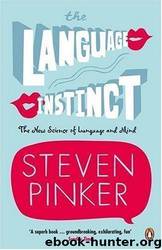The Language Instinct: The New Science of Language and Mind by Steven Pinker

Author:Steven Pinker [Pinker, Steven]
Language: eng
Format: epub
Published: 0101-01-01T00:00:00+00:00
At this point we enter a territory of fierce controversy but potentially large rewards. Greenberg’s hypothesis has been furiously attacked by other scholars of American languages. Comparative linguistics is an impeccably precise domain of scholarship, where radical divergences between related languages over centuries or a few millennia can with great confidence be traced back step by step to a common ancestor. Linguists raised in this tradition are appalled by Greenberg’s unorthodox method of lumping together dozens of languages based on rough similarities in vocabulary, rather than carefully tracing sound-changes and reconstructing proto-languages. As an experimental psycholinguist who deals with the noisy data of reaction times and speech errors, I have no problem with Greenberg’s use of many loose correspondences, or even with the fact that some of his data contain random errors. What bothers me more is his reliance on gut feelings of similarity rather than on actual statistics that control for the number of correspondences that might be expected by chance. A charitable observer can always spot similarities in large vocabulary lists, but that does not imply that they descended from a common lexical ancestor. It could be a coincidence, like the fact that the word for “blow” is pneu in Greek and pniw in Klamath (an American Indian language spoken in Oregon), or the fact that the word for “dog” in the Australian aboriginal language Mbabaram happens to be dog. (Another serious problem, which Greenberg’s critics do point out, is that languages can resemble each other because of lateral borrowing rather than vertical inheritance, as in the recent exchanges that led to her negligees and le weekend.)
The odd absence of statistics also leaves in limbo a set of even more ambitious, exciting, and controversial hypotheses about language families and the prehistoric peoplings of continents that they would represent. Greenberg and his associate Merritt Ruhlen are joined by a school of Russian linguists (Sergei Starostin, Aharon Dogopolsky, Vitaly Shevoroshkin, and Vladislav Illich-Svitych) who lump languages aggressively and seek to reconstruct the very ancient language that would have been the progenitor of each lump. They discern similarities among the proto-languages of Indo-European, Afro-Asiatic, Dravidian, Altaic, Uralic, and Eskimo-Aleut, as well as the orphans Japanese and Korean and a few miscellaneous language groups, reflecting a common ancestor proto-proto-language they call Nostratic. For example, the reconstructed Proto-Indo-European word for mulberry, mor, is similar to Proto-Altaic mur “berry,” Proto-Uralic marja “berry,” and Proto-Kartvelian (Georgian) mar-caw “strawberry.” The Nostraticists would have them all evolve from the hypothetical Nostratic root marja. Similarly, Proto-Indo-European melg “to milk” resembles Proto-Uralic malge “breast” and Arabic mlg “to suckle.” Nostratic would have been spoken by a hunter-gatherer population, for there are no names of domesticated species among the 1,600 words the linguists claim to have reconstructed. The Nostratic hunter-gatherers would have occupied all of Europe, northern Africa, and northern, northeastern, western, and southern Asia, perhaps 15,000 years ago, from an origin in the Middle East.
And various lumpers from this school have suggested other audacious superphyla and super-superphyla. One comprises Amerind and Nostratic.
Download
This site does not store any files on its server. We only index and link to content provided by other sites. Please contact the content providers to delete copyright contents if any and email us, we'll remove relevant links or contents immediately.
Rewire Your Anxious Brain by Catherine M. Pittman(18642)
Talking to Strangers by Malcolm Gladwell(13345)
The Art of Thinking Clearly by Rolf Dobelli(10450)
Mindhunter: Inside the FBI's Elite Serial Crime Unit by John E. Douglas & Mark Olshaker(9317)
Becoming Supernatural by Dr. Joe Dispenza(8199)
Change Your Questions, Change Your Life by Marilee Adams(7758)
Nudge - Improving Decisions about Health, Wealth, and Happiness by Thaler Sunstein(7690)
The Road Less Traveled by M. Scott Peck(7592)
The Lost Art of Listening by Michael P. Nichols(7488)
Mastermind: How to Think Like Sherlock Holmes by Maria Konnikova(7320)
Enlightenment Now: The Case for Reason, Science, Humanism, and Progress by Steven Pinker(7306)
Win Bigly by Scott Adams(7183)
The Way of Zen by Alan W. Watts(6600)
Daring Greatly by Brene Brown(6501)
Big Magic: Creative Living Beyond Fear by Elizabeth Gilbert(5754)
Grit by Angela Duckworth(5601)
Ego Is the Enemy by Ryan Holiday(5413)
Men In Love by Nancy Friday(5232)
The Laws of Human Nature by Robert Greene(5171)
